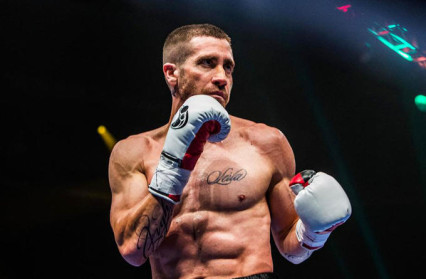James Knight casts a critical eye over Southpaw, the boxing film starring Jake Gyllenhaal which throws a few punches but misses every time.
Antoine Fuqua’s Southpaw is anti-cinema, and adding an apostrophe s on the end of Fuqua is somewhat misleading, because he did not make it, instead it was ‘directed’ around an oak boardroom table in L.A. over gluten free cake and imported mineral water by a committee of producers, agents, lawyers, advertisers, their assistants, even the caretakers that sweep up their offices when they’re bosses are sunning it in Acapulco for the weekend (hey, this movie needs a training montage!). Southpaw such an impersonal film that any bum with a Director’s Guild card could’ve made it; hell, any bum on the street for that matter. Go saunter down Sunset Blvd and find one – hey, pal, yeah you with the dog and the urine stained pants, you fancy directing a boxing pic called Southpaw, seen any flicks recently? – Um, I saw five minutes of some piece of shit rom-com last month through the window of an electrical goods store – Excellent, come with me, you’re more than qualified, now what do you think of Rachel McAdams in the role of the wife, do you think she can play street tough?
Whilst Jake Gyllenhaal’s anti-cinema performance continues the contemporary trend of actor’s hell bent on hiding in filmed theatre roles, running from their own personalities (maybe because they don’t have one), don’t they realise that cinema has always been about the present, about showing (Cary Grant, Jimmy Stewart, Lauren Bacall, Frank Sinatra) and not about hiding. Anyway, Gyllenhaal tries his best to empty his characters’ soul, but unfortunately for Jake it was empty long before he started ab crunching. It’s interesting to think that America is the only country really interested in making boxing pictures; maybe it’s the allure of redemption, the big shot who falls from the top to the bottom, but then because America is so free and so great and the fact that anyone can achieve anything with a little hard work and a little prayer here and there, the fallen can once again become the mighty. It’s no give away in saying that Southpaw is all of this and more, thanks largely to the combination of Kurt Stutter’s unimaginative script, Mauro Fiore’s cinematography that seems to equate to nothing more than dimming the lights (maybe this is an attempt at meta irony by mirroring the general dimness of the film), and James Horner’s manipulative score, with the end result being a simplistic film that seems to be under the impression that it’s a deep exploration of the psychological depths of Gyllenhaal’s character, but is actually more of an exploration of Gyllenhaal’s body (some may actually prefer this).
Gyllenhaal plays Billy Hope, an inarticulate bruiser born on the wrong side of town who punches his way to fame and fortune, before seeing his kingdom torn down, his assets sold off, his kid (Oona Laurence) carted off with social services, all as a result of the accidental shooting of his wife (McAdams) by a member of a rival boxer’s entourage, Miguel ‘Magic’ Escobar (Miguel Gomez), who himself is essentially nothing more than a cartoon villain. Curtis ’50 Cent’ Jackson plays Hope’s promoter, grinning his way through every scene like he too can’t believe he’s been cast in the role; watching him act is like watching a drunk trying to walk upwards on a downwards escalator. Morgan Freeman’s character from Million Dollar Baby plays the moralist trainer who helps to rejuvenate Hope’s career, only this time he’s played by Forest Whitaker. The two characters seem utterly alike, with their bad eyes, their beds in their offices, and their old world boxing wisdom and philosophising. Maybe it’s a nod of the hat to the Eastwood film, a homage, or maybe it’s pure dim-light robbery – whatever it is, Whitaker is best thing in the picture without ever really setting the world alight.
In general, the boxing sequences work (they’re shot like a video game, the problem is, so too is the rest of the film) with the brutality of each punch being felt. Whilst saying the film is completely void of emotion would be doing it a slight disservice as there some moving moments between Hope and his daughter as he fights to change his life and regain full custody. There’s a nice scene towards the end where Leila, backstage, watches her father box for the very first time and we get to see the world through her eyes which makes for a welcome change. Another high point is a training sequence where Whitaker’s Tick Wills attempts to change Hope from a fighter into a boxer, but, unfortunately for us, these scenes are always followed by a ‘but’.
Southpaw is a charmless effort that doesn’t get close to artisan status, let alone art. It’s a film that floats like a bee and stings like a butterfly.
Recommended for you…
Adam McKay’s Vice, a new Hollywood biopic of former United States Vice President Dick Cheney, lets the architects of the current global political rot off the hook, argues Francesca Montemaggi.












